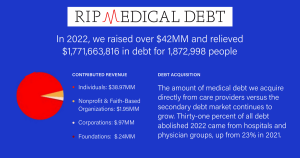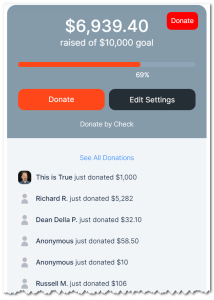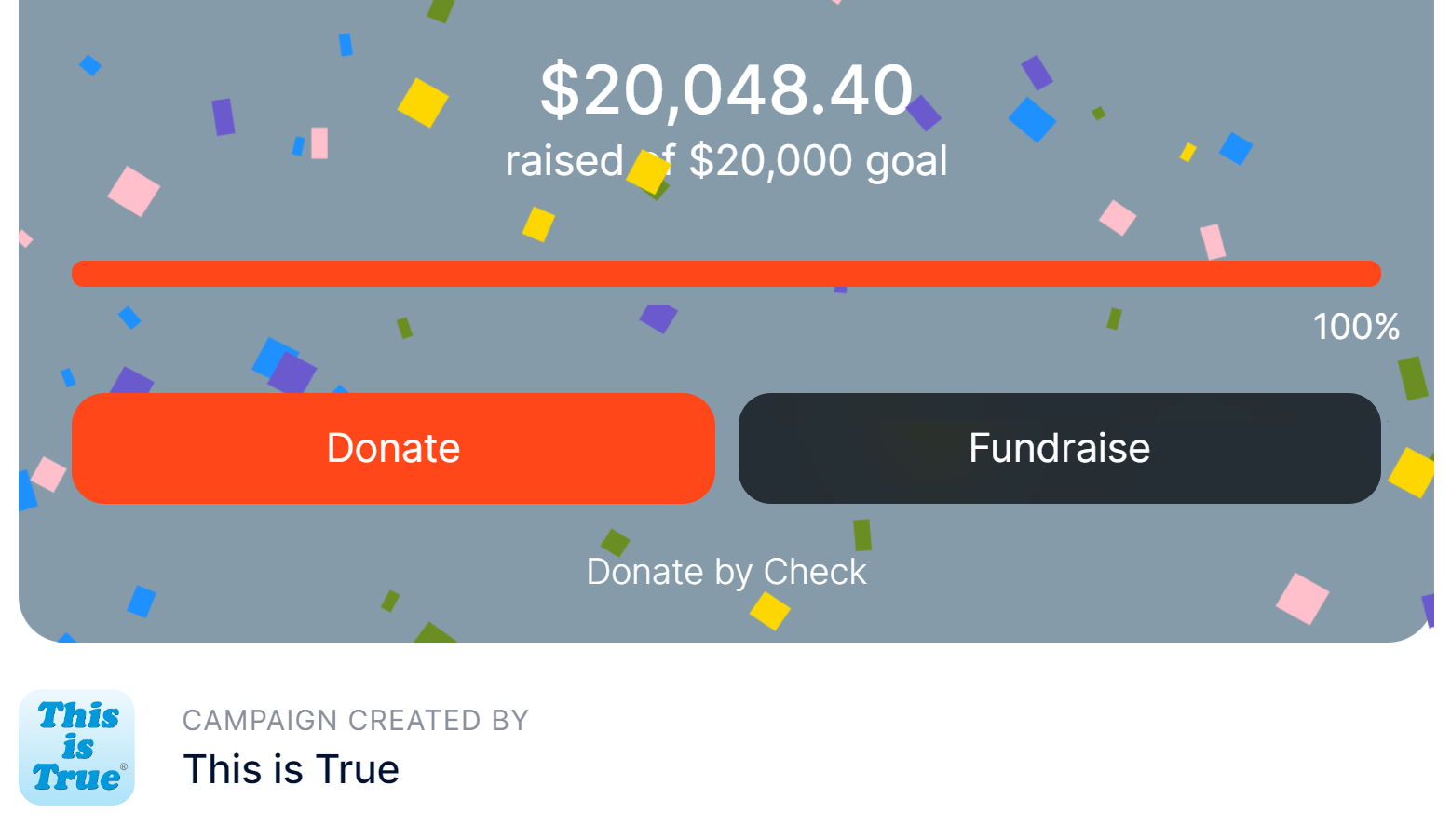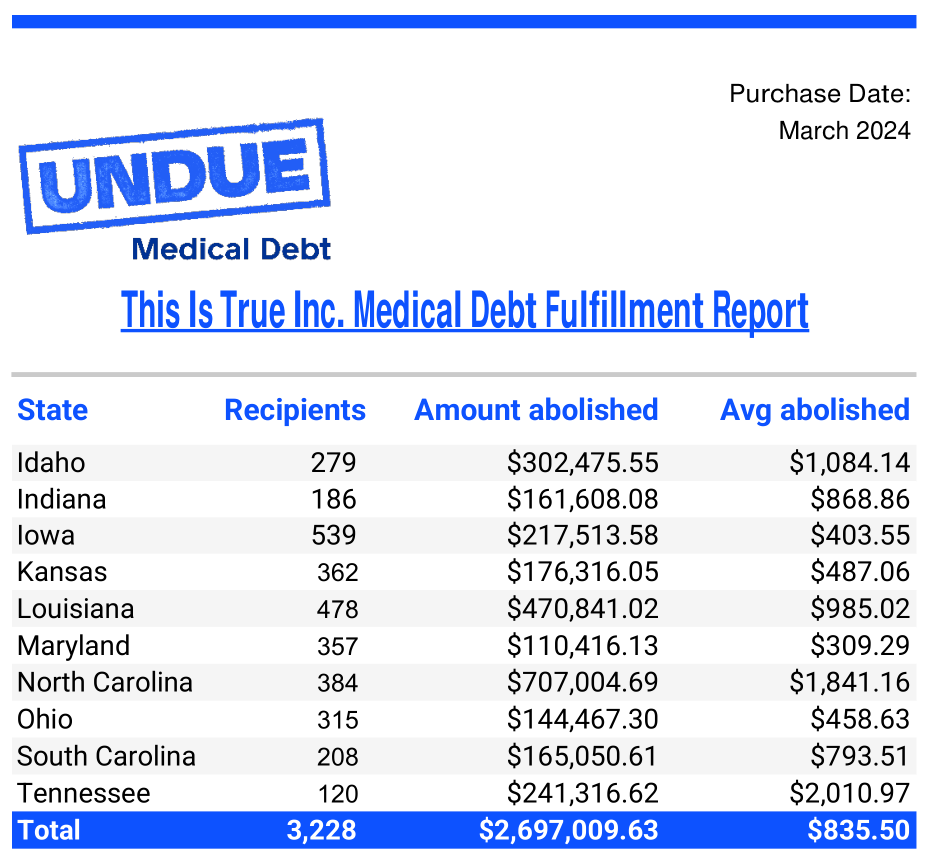The Last Story each week tends to be what I call a “feelgood” type to leave readers on an up note after sometimes fairly heavy stories.
As of this week, three of those stories have included mention of a particular nonprofit that I have admired since the first time I heard of them, so I’ve been keeping an eye out for actual news stories that feature them — hence the three as of this week. Let’s recap.
The first is from the Christmas season in 2020:
Love Thy Neighbor
The Rev. Minna Bothwell asked the congregation of the Capitol Hill Lutheran Church in Des Moines, Iowa, to think about how the church could expand their mission. What nonprofit could they fund that would be in keeping with their Biblical ideals? The congregation suggested an organization that buys up medical debt, and then forgives the people who owed it: they walk away with no debt, and no more creditors calling. The church called RIP Medical Debt and asked “how much money it would take to forgive all the medical debt in Polk County,” Bothwell said. “They responded, ‘With what you have, you could forgive [medical] debt in all of Iowa’.” It only took about $8,000 for the church to fund the organization in buying up $5 million worth of medical debt owed by Iowans. “We’ve seen firsthand what debt has done to families, and how hard it can be,” Rev. Bothwell said. It was so easy, the church is now raising $15,000 to zero out all the medical debt in Missouri. “2020 has been a rough year for everyone,” she said. “Our goal as a congregation is to give people a good start on 2021.” (RC/Des Moines Register) …Here’s to 2021!
If I understand correctly, it was this story (probably not True’s version, but the news story in general) that inspired Casey and Andrew — see the third story of this series below.
The second is from October 2023:
Tough News for the 401 Percenters
As it prepared its budget for next year, the Kalamazoo County (Mich.) Board of Commissioners found it had a little extra money that wasn’t otherwise earmarked, thanks to getting federal stimulus funds. The Board voted to spend $466,000 with a nonprofit which will use it to buy all of the estimated $89 million in medical debt owed by county residents. Well, at least the debt owed by residents who earn 400 percent of the federal poverty level or less, which is 38,300 residents out of a total of around 261,000. “The nonprofit works to settle the debt at a lower rate, and would essentially be pennies on the dollar,” explained county spokesman Taylor Koopman, speaking of RIP Medical Debt, a New York-based charity. (RC/Kalamazoo Gazette) …Sure it feels good, but is that what tax money is for?
In other words, I absolutely love what RIP Medical Debt is doing, but I question whether tax money should be spent in this way. I much prefer the voluntary approach as modeled by the Iowa church in the first story.
So then comes the third story from this week, demonstrating a hugely successful individual approach:
Legacy
“If you’re reading this I have passed away,” tweeted Brooklyn, N.Y., book publisher Casey McIntyre, 38. Really, her husband posted it for her: she had ovarian cancer, and she wasn’t able to beat it and watch her young daughter grow up. Her husband, Andrew Rose Gregory, said Casey knew that various dreams of “curing cancer” have not worked, so he and Casey had another idea. One in 10 American adults have $250 or more in medical debt; 11 million owe more than $2,500 each. “What if we could just help people who are being crushed by medical debt?” Gregory asked. So he also included a link to a campaign to raise $20,000 to buy up medical debt racked up by others in her memory, via the nonprofit RIP Medical Debt. The campaign quickly blew up to more than 20 times the goal — enough to buy up more than $40 million of medical debt. The nonprofit says this is the first time someone set up a campaign to start after their death. (RC/AP) …But with success like that, it won’t be the last time.
My Idea (Note: Campaign Closed, See Update)
Sometimes when I read a story like that, I don’t want to just read the story, I want to be a part of it. It occurred to me as I wrote that third story that you might like to be a part of it too. Hence I’ve created an RIP Medical Debt campaign for This is True readers — you. They are a 501(c)(3) charity and your donation is 100 percent tax deductible (check with your tax advisor for details specific to your financial situation).

Charity Navigator rates RIP Medical Debt as a Four-Star (“Great”) Charity with 98 of a possible 100 points (check current score).
To be perfectly clear, this campaign is for readers to help others in general, not to specifically benefit True readers who happen to have unpaid medical debt.
Also to be clear, this nonprofit helps Americans in medical debt. We have a pretty insane medical system in the U.S.: we pay much more per capita for medical care in the U.S. than people in other countries, and get much less actual care from the system than people in other countries. Why? Because of corporations set up to do what corporations do: extract huge profits.
I’m just fine with corporations making profits, but it seems pretty callous to do it on the backs of those who are struck with disease and trauma — unwilling customers. That’s why it was literally illegal in the U.S. for hospitals to be for-profit entities until Henry Kaiser personally lobbied his friend, President Richard Nixon, to change the law in the 1970s — and look at what that has wrought today: medical debt is the number-one reason for personal bankruptcy in the U.S.
Join Me?

Again, I want to be part of this story too, so I will match the first $1,000 in reader contributions to this fund. Your contributions will be used by the nonprofit as soon as funds clear, and I will continue to raise the goal as it is met. There is no deadline: the campaign is open-ended. *
Each dollar donated will enable RIP-MD to buy up around $100 of medical debt owed by individuals, and sometimes more as shown above. Those debts will literally be erased so the people involved no longer owe it: to date RIP-MD donors have erased more than $10 Billion in medical debt.
For this campaign, any amount really will help, since it will be added to the total donated by other True readers — and to the total brought in by other similar campaigns such as the ones noted in the stories above.
Note for Foreign Readers: I actually don’t think non-American readers should feel compelled to contribute to this campaign since it really is an American mess — though if you feel so inclined, I’ll consider you to be doubly generous.
*Update
Unfortunately, in discussion with my contact at RIP-MD I learned that they don’t allow open-ended campaigns: they limit them to four months, which means it ended on March 19, 2024. I decided to not set up a new one. I told my contact “I wonder how many thousands of dollars RIP will miss out on, then, but thanks for letting me know.” Her response? “You’re very welcome!”
Thanks to a very generous donation very early on, then plus my $1,000 match, it was obvious the initial $10,000 goal was too small, so I once I added mine I doubled the goal. Indeed you all made it happen, so RIP-MD was able to buy up a bit more than $2 million in medical debt, relieving that burden for many, many people.

Final Update
Today — 15 April 2024 — RIP Medical Debt announced that they have changed their name to Undue Medical Debt, and today, they sent me a report on exactly where our donations went. I had guessed that they would do better than $100 of retired debt for every $1 donated, and boy was that the case! And they put the money to use right away:

Bottom Line: each dollar donated cleared $134.52 of overdue medical debt. Now that is an efficient use of funuds.
– – –
Bad link? Broken image? Other problem on this page? Use the Help button lower right, and thanks.
This page is an example of my style of “Thought-Provoking Entertainment”. This is True is an email newsletter that uses “weird news” as a vehicle to explore the human condition in an entertaining way. If that sounds good, click here to open a subscribe form.
To really support This is True, you’re invited to sign up for a subscription to the much-expanded “Premium” edition:
Q: Why would I want to pay more than the minimum rate?
A: To support the publication to help it thrive and stay online: this kind of support means less future need for price increases (and smaller increases when they do happen), which enables more people to upgrade. This option was requested by existing Premium subscribers.

Thanks for sponsoring and supporting this Randy. A wonderful idea.
Since I am on the board at a food pantry, I regularly see how medical bills can overwhelm a family emotionally as well as financially.
—
Thank YOU for your work at the pantry! It’s sad that they’re SO needed, but they are. -rc
Thanks, Randy. I’d been wanting to contribute in memoriam for my dad, who was a doctor, but I was always a bit uncertain about the group’s validity. With your seal of approval, I’m comfortable doing so now.
—
Yes, I’m quite comfortable with them. Glad you could honor your father in that way, AND with that you broke the first $1,000 (in quite a big way), so after approving this I’m heading over to match the first thousand. Thank you! -rc
And this is why sane people in the UK hate what is happening to our National Health Service. The idea that in a wealthy, supposedly civilized, country people can become bankrupt because of medical debt would be unbelievable except we can see it happening.
As someone who lives in a country with an imperfect but sane medical system, I would say that spending tax money on forgiving medical debt is a good thing, but spending it on medical care in the first place would be far better.
(Yes, I favour voluntary giving when relevant, but it’s disturbing that it is even relevant in this scenario, for the reasons you give.)
Thanks for telling us about RIP Medical Debt. I’ve just made a donation. It’s a great idea. I’ve been lucky enough to always have health insurance through work, and been able to afford what more has come my way.
In 60’s I was working in a Uni in OZ and met a USA PHD student ,the conversation turned as to why he came to OZ. “It was the the first offer I got “.the story was his son got sick and in hospital to save sons life he signed lots of paper .
He now owed medical bills which could not pay in years .to brow money and add interest would keep him in penury for a life time .
His solution is get out from under and negotiate from a distance .Stay out of the states till the debt comp. settles .
as an outsider your country puzzles me .you develop the system and other countries use them as shown by many docos
It seems like such a good idea, but in the interest of what’s apparently true, there is evidence that getting rid of someone’s medical debt doesn’t do much to make their lives better.
Reported in the New York Times (where I first saw it), there’s an National Bureau of Economic Research (NBER) report on two studies of the effects, which is here.
Donating to help get rid of medical debt probably does more good for the contributors (in improved mental health) than the people whose debt gets bought up and retired.
—
I don’t mind having a contrary opinion raised. Haven’t looked at the report yet, but relieving medical debt at least means they can concentrate more on other debts, like student loans, credit cards, etc. -rc